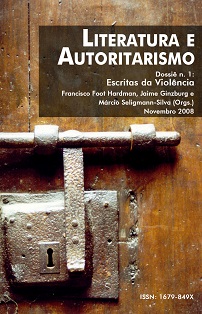In between the tragic: Perlongher and the “corpses” of the nation
DOI:
https://doi.org/10.5902/1679849X74592Keywords:
Néstor Perlongher, Exile, ExtraterritorialityAbstract
Focusing on the works of Néstor Perlongher (1942-1992, exiled in Brazil since 1982) the article studies the writing of this Argentinean poet and anthropologist that “contaminated” aesthetically his apparent “language of origin” (the Spanish) with the language of the host language (the Portuguese). The article try to analyses the relations between nationality and language and the transgression of the Argentinean identitary discourse involved in the poetic writing of Perlongher.
Downloads
References
AIZENBERG, Edna. Holocausto, memória judaica e memoriais do terror no cone sul. Remate de males 26.1, Instituto de Estudos da Linguagem – Unicamp, jan-jun 2006, p. 71-80.
ALCALDE, Ramón. Ilusiones de isleño. Sitio no. 3, Buenos Aires, diciembre de 1983.
ANDERSON, Benedict. Comunidades imaginadas: reflexiones sobre el origen y la difusión del nacionalismo. México: FCE, 1993.
CANGI/SIGANEVICH (comps.). Lúmpenes Peregrinaciones: ensayos sobre Néstor Perlongher. Rosario: Beatriz viterbo, 1996.
DE CAPOA, Chiara. L’Ancien Testament. Repères iconographiques. Paris: Hazan, 2003.
DERRIDA, J. Le monolinguisme de l’autre. Paris : Galilée, 1996.
ECHAVARREN, Roberto. Un fervor neobarroco. In: PERLONGHER, Néstor. Poemas Completos. Buenos Aires: Planeta, 1997.
FREUD, Sigmund. Moisés y la religión monoteísta: três ensayos. In : _____. Obras Completas. Volumen 19. Buenos Aires: Hyspamerica, 1988.
GASPARINI, Pablo. Riscos do português / Riscos do castelhano (a língua portuguesa na poesia do argentino Nestor Perlongher). Ipotesi. Volume 9, nos. 1 e 2, Universidade de Juiz de Fora, 2005.
JINKIS, Jorge. A la tíbia musa, de um vate desencantado. Sitio no. 3, Buenos Aires, diciembre de 1983.
LEYLAND, W. (org.). My deep dark pain is love. San Francisco: Gay Sunshine Press, 1983.
MAFFESOLI, MICHEL. O instante eterno: o retorno do trágico nas sociedades pós-modernas. São Paulo: Zouk, 2003.
MELMAN, C. Imigrantes: incidências subjetivas das mudanças de língua e país. São Paulo, Escuta, 1992.
PERLONGHER, Néstor. Alambres. Buenos Aires: Último Reino, 1987.
PERLONGHER, Néstor. Austria-Hungría. Buenos Aires: Tierra Baldía, 1980.
PERLONGHER, Néstor. Evita vive e outras prosas. Tradução de Baptista Josely Vianna. São Paulo: Iluminuras, 2001.
PERLONGHER, Néstor. Lamê, edição bilíngüe espanhol-português. Tradução de Baptista Josely Vianna. Campinas: Unicamp, 1994.
PERLONGHER, Néstor. O negócio do michê: prostituição viril em São Paulo. São Paulo: Brasiliense, 1987.
PERLONGHER, Néstor. Poemas Completos. Buenos Aires: Planeta, 1997.
PERLONGHER, Néstor. Prosa Plebeya. Buenos Aires: Colihue, 1997a.
PERLONGHER, Néstor. Documento 0790. “Lamborguini, Carrera, Lamborguini: Un ‘nuevo’ verso rioplatense?” São Paulo, jun. e jul. 1982. 18 pp., dt. c/ correções ms. e xerox.
PONGE, Francis. Le Savon. Paris: Gallimard, 1992.
SCHWARTZ, Jorge (org.). Cuadernos de Recienvenido no. 18. Homenaje a Néstor Perlongher. Universidade de São Paulo, 2000.
STEINER, George. Extraterritorial: ensayos sobre literatura y revolución lingüística. Barcelona: Barral, 1973.
TOURN, Lya. Chemin de l’exil: vers une identité ouverte. Paris: Editions Campagne Premiere, 2003.
Downloads
Published
How to Cite
Issue
Section
License
DECLARAÇÃO DE ORIGINALIDADE E EXCLUSIVIDADE E CESSÃO DE DIREITOS AUTORAIS
Declaro que o presente artigo é original e não foi submetido à publicação em qualquer outro periódico nacional ou internacional, quer seja em parte ou na íntegra. Declaro, ainda, que após publicado pela Literatura e Autoritarismo, ele jamais será submetido a outro periódico. Também tenho ciência que a submissão dos originais à Literatura e Autoritarismo implica transferência dos direitos autorais da publicação digital. A não observância desse compromisso submeterá o infrator a sanções e penas previstas na Lei de Proteção de Direitos Autorais (nº 9610, de 19/02/98).






